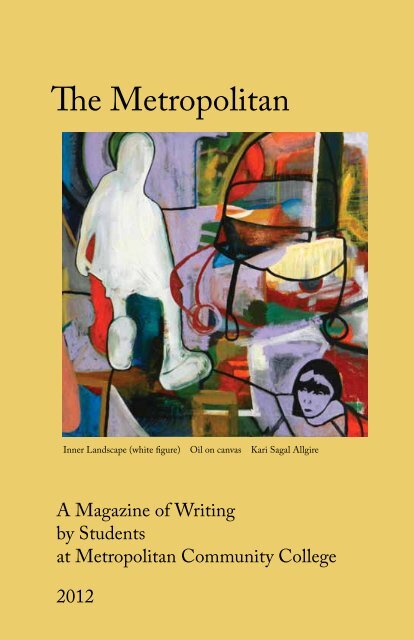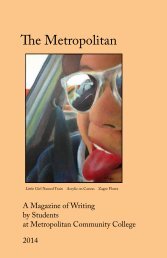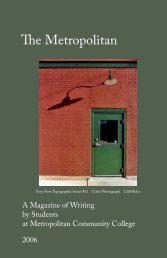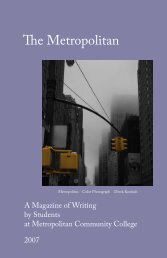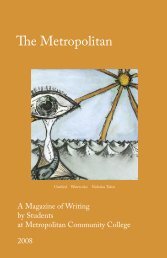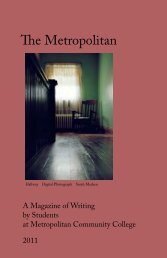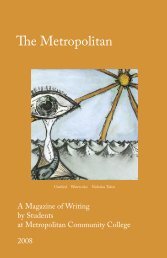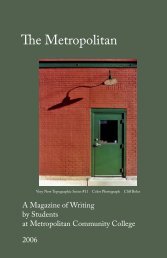2012 Issue
You also want an ePaper? Increase the reach of your titles
YUMPU automatically turns print PDFs into web optimized ePapers that Google loves.
The Metropolitan<br />
Inner Landscape (white figure) Oil on canvas Kari Sagal Allgire<br />
A Magazine of Writing<br />
by Students<br />
at Metropolitan Community College<br />
<strong>2012</strong>
The Metropolitan<br />
A Magazine of Writing<br />
by Students<br />
at Metropolitan Community College<br />
<strong>2012</strong><br />
“Rather than love, than money, than fame, give me<br />
truth.”<br />
Henry David Thoreau
The Metropolitan <strong>2012</strong><br />
Editors:<br />
Cindy Catherwood<br />
Charlie Cogar<br />
Paul Dickey<br />
Lorraine Duggin<br />
Susan Ely<br />
Dora Gerding<br />
Maria Gutierrez<br />
Chad Jorgensen<br />
Erin Joy<br />
Steve Lovett<br />
Brett Mertins<br />
Michelle Oswald<br />
Jody J. Sperling<br />
Katie Stahlnecker<br />
Sara Staroska<br />
Technical Advisors: Jamie Bridgham, Jeanne Hansen, Rebecca Orsini<br />
Editorial Assistants: Nicolle Cain, Donna Smith, Jane Smith<br />
The Metropolitan publishes all types of academic and literary writing, including<br />
descriptive, narrative, expository, and persuasive works, as well as creative<br />
prose and poetry. We encourage writings from across the disciplines and also<br />
welcome visual art. Our goal is to showcase the best of the many voices, styles,<br />
and subjects MCC writers and readers find meaningful and to support critical<br />
thinking, creativity, and expression at Metropolitan Community College.<br />
Contents<br />
<strong>2012</strong> Writing Awards 4<br />
Jonathan Mcgill<br />
We Do What We Can 5<br />
William L. Coleman<br />
Return to the Nodaway 6<br />
Brigid Amos<br />
Stair Lift 10<br />
Kristin Pluhacek<br />
Lap 30<br />
Stephanie Cleary<br />
Only Girl in the Subway 32<br />
The Metropolitan is published once a year. The print edition includes<br />
the best selections from the full web edition which can be read at<br />
http://resource.mccneb.edu/metropolitan<br />
Inquiries to metropolitan@mccneb.edu or to<br />
The Metropolitan c/o Cindy Catherwood<br />
South Omaha Campus<br />
Metropolitan Community College<br />
P.O. Box 3777<br />
Omaha, Nebraska 68103-0777<br />
Printed on recycled paper in Omaha, Nebraska by Barnhart Press<br />
©<strong>2012</strong>
We Do What We Can<br />
Jonathan Mcgill<br />
<strong>2012</strong> Writing Awards<br />
For his poem “We Do What We Can,” Jonathan Mcgill<br />
is the winner of The Metropolitan <strong>2012</strong> Prize for Student<br />
Writing, a 13.5-credit-hour tuition remission. The first runnerup<br />
prize goes to two writers this year. Brigid Amos is awarded<br />
9 credit hours tuition remission for her play Stair Lift. William<br />
L. Coleman is awarded 9 credit hours tuition remission for his<br />
essay “Return to the Nodaway.” The second runner-up, Stephanie<br />
Cleary, receives 4.5 credit hours tuition remission for her poem<br />
“Only Girl in the Subway.” The GED prize of 4.5 credit hours<br />
tuition remission goes to Nicholas Prososki, whose essay “Si Vis<br />
Pacem” is published at http://resource.mccneb.edu/metropolitan.<br />
She leans on her tiptoes, places the angel Gabriel<br />
on top of the tree, pauses a moment to hold him<br />
steady. We stand away, smile at what we’ve done,<br />
and she can’t help herself—it’s not her fault<br />
she’s got so many good stories to tell. She holds up<br />
a homemade card, says to me, “This you did<br />
in first grade,” and it’s just a flimsy, folded paper, ratty<br />
and bent to hell and red as love itself. She asks<br />
if I remember, and I’m sorry, I don’t. I never do. These<br />
days I’m so smoothed out nothing ever sticks. But I say<br />
“I do, Mom, of course I do” because the feeling I get<br />
is she needs this more than anything. And before<br />
either of us understands what has happened, the table<br />
is full of old photographs and albums, and she’s grabbing<br />
the baby blue one, peeling through the plastic pages.<br />
She stops on Christmas ‘86. And we’re all there<br />
in festival glow, arms slung around shoulders like ropes<br />
about to fray. “Look at you,” she says. “So tiny and cute.”<br />
Her hand rests on the page, her finger over my printed<br />
heart, and the kid isn’t me—we’ve grown and grown<br />
apart, and all I see is how the Coumadin has bruised her,<br />
made her skin near see-through. And I don’t know<br />
what to say when she says, “You were always my favorite.”<br />
The Metropolitan 5
Return to the Nodaway<br />
William L. Coleman<br />
I remember that day in late December. It was cold and<br />
cloudy. It had just snowed a couple of days before, and I had just<br />
given up on my dreams. As I heard the slush splashing under the<br />
wheels of my brother’s van, I gazed outside at the gray of day,<br />
seeing nothing but distant memories. Thirty-five years of fighting<br />
for the American dream. What a waste. I had nothing to show<br />
for my efforts. My family traded me in for a newer model. My<br />
house—my castle—gone. I lost everything I owned. Where did<br />
I go wrong? My brother was taking me to my mother’s house, a<br />
place in Iowa that was as dead as the sun was to me, a place that<br />
I had run away from as a teenager, vowing never to return, so help<br />
me God.<br />
There was nothing there, and nothing ever changed, but I<br />
needed a break. I needed a place to rest, to figure out my place in<br />
society, because I refused to accept my current situation.<br />
Rod and I didn’t speak too much on that two-hour drive<br />
through snow-blanketed fields and scattered Iowa pine. If I had<br />
opened my mouth, I might have cried for two hours, and my<br />
brother probably knew that.<br />
My mom, a short, gray-haired, Christian woman, met me at<br />
the door with open arms, ready to give me a warm, knowing hug.<br />
She embraced me. I tried to hold the lump in my throat down.<br />
With a broken voice, I excused myself and grabbed a couple of<br />
Hefty bags filled with my most valued possessions. All that I<br />
owned I carried up the creaky steps to my old room. Nothing had<br />
changed. I looked out the milky windows toward Main Street.<br />
A piece of paper rolling across Grove Avenue brought with it a<br />
reality check: I had wasted all my time only to return to where I<br />
started from.<br />
I was so tired, and nothing made sense anymore. I stayed in<br />
that dark, little, dust-filled room for days. The walls were covered<br />
with a print popular in the early sixties. The linoleum floor was<br />
equally outdated and cold on my feet. I didn’t feel like doing<br />
anything, not even looking out the window. My mother would<br />
invite me to eat with her at times, but I was too ashamed to be in<br />
the same room with her. I remembered old phone conversations,<br />
bragging about how good my life was. Now I didn’t own a car,<br />
and I didn’t have a job or even the heart to get one.<br />
It was late spring before I was able to break the boundaries<br />
of that old town home. I would take short walks through alleys<br />
lined with old lawnmowers, bikes and piles of split wood.<br />
Nothing had changed.<br />
I walked down Main Street to the bottom where the feed<br />
store stood. Glancing in, I could see the old-timers drinking<br />
coffee and playing pitch. I knew what they were talking about:<br />
how many calves they got that spring or what they were going<br />
to plant and if the weather would hold up. Carmichael was<br />
still cutting hair on Main Street. Rule was you didn’t go in the<br />
afternoon because he took his lunch at J.O.’s Outlaw, a tavern<br />
I frequented after school. I would play pinball and pool when I<br />
should have been doing my homework.<br />
Then summer came, and on a sunny day I found myself<br />
walking near the railroad tracks. I used to play down there,<br />
chucking loose railroad spikes at trees and perfecting my rock<br />
throwing. The sun was hot. It warmed my skin like a cup of<br />
coffee on a winter morning. Curiously, I took the tracks out of<br />
town. Finding a spike, I heard the old thump of metal against<br />
tree. The birds were singing, and I heard a squirrel chatter but<br />
couldn’t see it. As I “walked the line,” I began to remember the<br />
summer days of high school. I knew where I was.<br />
These railroad tracks ran next to the Nodaway River. The<br />
Nodaway is usually only about three feet deep, but there are holes<br />
along its steep slopes where the catfish like to eat and sleep. I’ve<br />
caught catfish, drum and carp out of the Nodaway. One time, I<br />
almost snagged a bull snake. My favorite place on the Nodaway<br />
had been the railroad trestle, about a mile from where I was<br />
walking.<br />
I wondered if it was still the same. Cynically, I thought that<br />
it might be the only thing around here to have changed. Last<br />
time I was there, Scotty Lenz; the Minzer brothers, Bill Earl and<br />
Harry; the Snider brothers, Jerry and Gary; and I were skipping<br />
school.<br />
6 The Metropolitan The Metropolitan 7
Scotty and Earl soaked a tree with whiskey and an El<br />
Camino a few years back, and Harry’s brain was about to<br />
give birth to the hereafter in the county home. I suspected he<br />
wouldn’t be around much longer.<br />
That bridge was over twenty feet above the Nodaway, and<br />
we boys would jump off into a deep, cool hole all afternoon.<br />
About five feet from the old cement pillar was our target. We<br />
were crazy; we were young.<br />
I had nothing else to do that afternoon, so I walked that<br />
mile. When I got to the trestle, it was still the same, though this<br />
time I didn’t hear the dares and laughter of my boyhood friends.<br />
Today, I only heard the birds and the breeze rustling the leaves of<br />
walnut, oak, maple and cottonwood trees.<br />
I sat down on the sun-warmed cement pillar of that railroad<br />
trestle with my feet dangling above the murmur of the Nodaway,<br />
getting lost in my memories, my reasons for leaving this place.<br />
Now, deserting my dreams, I was back to the kind of life I had<br />
tried so hard to avoid. Would I be sitting in a bar, staring at a<br />
taken farm girl and working for scratch at the Safeway? What<br />
about the rest of my life? I still wanted to travel and explore, to<br />
build and to fish.<br />
A crunch of leaves and twigs interrupted my thoughts, a<br />
doe and fawn, a playful drop in the water to splash them. Quietly<br />
and with slow movements, I tore my faded red pocket tee shirt<br />
off, and the moment it touched the creosote-soaked ties, they<br />
spotted me. In that second, we looked eye to eye. Then they<br />
blazed a trail through the undergrowth and were gone.<br />
Old age must have been creeping up on me. Jumping<br />
into that hole blind could leave a man crippled or dead. So I<br />
barefooted carefully over the boulders and gravel, avoiding the<br />
pricks of wild rose and gooseberry bushes to see if my swimming<br />
hole was still there.<br />
The current was slow, and the sun shone on the ripples I<br />
made as I tiptoed on the unseen rocks. I waded out to the base<br />
of the bridge and found my target. Still deep and cold, I swam<br />
under, kicking and grasping for branches and logs. There were<br />
none. Excitedly, I climbed out into the warm, bright sun, and<br />
with the abandonment of a teenager, I all but ran up the steep<br />
bank to the tracks. Looking down into the water, I felt my face<br />
crack with a grin. My heart began to pound in my chest as I<br />
anticipated free-falling into the Nodaway.<br />
I looked around and saw no one.<br />
With two large strides, I was suspended between heavens<br />
and earth. Eyes closed and breath held, I cannonballed classically.<br />
My stomach was still up there, and I heard the sound of light<br />
as I felt the coolness of the river. When I came to the surface,<br />
spewing water, I laughed and cried out loud, thanking God for<br />
leaving the Nodaway unchanged.<br />
As I opened my eyes, the air sparkled against the blue sky<br />
like fairies with sunbeams to feed their gardens. Floating on<br />
my back, I saw a hawk listing lazily, enjoying another summer<br />
day. As I treaded water, I felt the small fish pecking against my<br />
submerged body and was surprised. I had forgotten about that.<br />
I looked around at the rocks and sand, bushes and trees, and<br />
vividly saw the contrast of the rich soil against the many greens<br />
and bark. I heard the birds singing time with the babble of the<br />
Nodaway, a love song, I’m sure.<br />
As I walked home that day, the wild flowers waved and<br />
bowed to the prodigal son.<br />
8 The Metropolitan The Metropolitan 9
Stair Lift<br />
Brigid Amos<br />
A modestly furnished living room in a small house in Lincoln, Nebraska.<br />
Among other furnishings, there is an easy chair with an end table at its<br />
arm. A door upstage right leads to an unseen bathroom. Stairs upstage left<br />
lead to the upstairs of the house. These stairs are never used by the actors<br />
but should be indicated in some way. The unseen kitchen is offstage right.<br />
An unseen picture window, through which the actors look out over the<br />
audience, is downstage center. A twin-sized inflatable mattress made up<br />
with sheets, blanket, and pillow lies downstage center on the floor.<br />
At rise, Mother, a woman in her seventies, leans on her walker<br />
downstage center in front of the mattress, looking up and down the<br />
street. After a few seconds, Ellen, a forty-six year old woman, enters from<br />
stageright and looks at Mother in exasperation.<br />
ELLEN: Mother, why do you keep looking out that window?<br />
MOTHER: I’m looking for the moving van.<br />
ELLEN: The van will be here soon enough. They have the address.<br />
What do you think? They’re driving around town looking for a<br />
house with an old lady staring out the window?<br />
MOTHER: Ellen, please don’t call me old! You know how that<br />
upsets me.<br />
ELLEN: Oh, that’s right. You’re not old. I meant to say they’re<br />
driving around looking for the house with a female septuagenarian<br />
staring out the window.<br />
MOTHER: Now I don’t even understand what you’re saying.<br />
ELLEN: You don’t understand what?<br />
MOTHER: That word you just used. I don’t understand that word.<br />
ELLEN: You mean septuagenarian? You don’t understand that<br />
word? It means—<br />
MOTHER: I know what it means. I’m not stupid. I know my<br />
vocabulary. I just don’t know why you’re using that word on me.<br />
Nobody uses that word that way.<br />
ELLEN: Sure they do. They use it when they’re not allowed to use<br />
the word old on someone well, and I mean well, into her seventies.<br />
Septuagenarian is politically correct.<br />
MOTHER: Well, we didn’t have politically correct in my day. We<br />
knew what we meant to say, and we said it straight.<br />
ELLEN: All right then, how should I describe you? You don’t care<br />
for the word septuagenarian, so give me a better word and I’ll use it.<br />
MOTHER: Well, I don’t see why you have to describe me at all.<br />
ELLEN: I won’t then. I promise I’ll never describe you again.<br />
MOTHER: Good.<br />
ELLEN: Mother, just come away from the window. Staring down<br />
the street won’t make the van come any faster.<br />
MOTHER: But I need my bed, Ellen. I need to sleep in my<br />
own bed on my own mattress. (Kicking the air mattress through her<br />
walker.) I can’t sleep on this leaky thing one more night. I’m sorry.<br />
It’s like sleeping on a deflated balloon. My hip bone is right on the<br />
floor.<br />
ELLEN: It’s not leaky. I just bought this mattress. I probably didn’t<br />
inflate it enough, that’s all.<br />
MOTHER: That thing was a waste of money if you ask me. I could<br />
have slept better on the couch.<br />
ELLEN: All right. I know that now.<br />
MOTHER: Shouldn’t you get it out of the way? Aren’t they going<br />
to set my bed up down here?<br />
10 The Metropolitan The Metropolitan 11
ELLEN: Yes, that’s right. Let’s see…(She picks up the air mattress and<br />
bedding, carries it upstage, and props it up against a wall.) I’ll just stick<br />
it over here. I’ll deflate it later; it’s kind of an ordeal. (She strips the<br />
mattress and begins to fold the bedding. She may continue this business at<br />
other times as needed.)<br />
MOTHER: You’ll never even use that thing again.<br />
ELLEN: Sure, I will. I’ll use it for houseguests.<br />
MOTHER: Houseguests? What houseguests are you going to get<br />
out here?<br />
ELLEN: Oh, I don’t know. Maybe Sally and Greg and the kids.<br />
MOTHER: Your sister is not coming here to visit. I can tell you<br />
that right now. This is not Sally’s type of place.<br />
ELLEN: What do you mean not her type of place?<br />
MOTHER: The house, the town, even the state. Sally is used to a<br />
higher level of living. She’s used to moving among a better class of<br />
people. I mean, look at this neighborhood, Ellen.<br />
ELLEN (joining her mother at the window): What’s wrong with it?<br />
Tell me one logical thing that’s wrong with it.<br />
MOTHER: Okay. (Pointing out the window.) See that white house<br />
across the street? There isn’t a single tree, or bush, or flower, or any<br />
other plant besides grass in that yard.<br />
ELLEN: Maybe they want to keep it simple.<br />
MOTHER: Maybe they’re just lazy.<br />
ELLEN: You don’t know that, Mother.<br />
MOTHER: Besides, the grass is weedy, and there are bare patches<br />
everywhere. Would it kill them to throw down some grass seed once<br />
in a while?<br />
ELLEN: I don’t know, Mother. Maybe it would kill them. Maybe<br />
the whole family has a deathly allergy to grass seed and would go<br />
into anaphylactic shock in seconds if they threw down some grass<br />
seed.<br />
MOTHER: I wish you would just speak plain English once in<br />
awhile.<br />
ELLEN: All right.<br />
MOTHER: I mean, I know you have this doctorate and all that, but<br />
it doesn’t give you the right to bombard people with these ten-dollar<br />
words…. Anyway, that little white house is not the only problem<br />
house on this street. Take a look at this other one.<br />
ELLEN: Which house? That yellow one there?<br />
MOTHER: Oh, yes. The yellow one.<br />
ELLEN: It looks all right to me. I see a linden tree in the front yard,<br />
a yew hedge by the house, some hostas coming up in the bed there.<br />
Seems to pass muster if you ask me.<br />
MOTHER: Have you gone blind all of a sudden? How many cars<br />
do you see parked there?<br />
ELLEN: Well, I see four in the driveway and three parked on the<br />
street out in front. Plus there’s a two-car garage, so there may be<br />
more parked inside. Oh, and there are two more parked on the lawn<br />
over here next to the house. So?<br />
MOTHER: Doesn’t that seem strange to you?<br />
ELLEN: Maybe they’re having a party?<br />
MOTHER: And everyone who comes to this party drives a junker<br />
car manufactured before 1980?<br />
ELLEN: Probably not.<br />
12 The Metropolitan The Metropolitan 13
MOTHER: So? There must be an ordinance against that sort of<br />
thing. We should notify the authorities that this person is keeping<br />
junker cars on his property. I bet they aren’t even registered.<br />
ELLEN: I don’t know whether they’re registered or not.<br />
MOTHER: So you’ll call the authorities?<br />
ELLEN: No, I’m not calling the authorities, Mother.<br />
MOTHER: Why not?<br />
ELLEN: Because I live in this neighborhood. I live right down the<br />
street from those people. I really don’t need that kind of trouble.<br />
MOTHER: Well, I have to live in this neighborhood, too.<br />
ELLEN: What?<br />
MOTHER: I said I have to live here, too.<br />
ELLEN: Oh, yes.<br />
MOTHER: I have to look at all that now.<br />
ELLEN: Yes. Mother, sit down, would you? You’re making me<br />
nervous.<br />
MOTHER: All right. I am feeling a bit tired. (Goes to the easy chair.)<br />
ELLEN (trying to help her mother sit in the easy chair): Do you need<br />
help getting down?<br />
MOTHER (waving Ellen off): No, no. Leave me alone now. I can<br />
get down all right. It’s getting up that I need help with.<br />
ELLEN: All right, all right! Comfortable?<br />
MOTHER (reaching underneath herself): Sort of. Is there a spring<br />
popped in this seat?<br />
ELLEN: I don’t know. I bought it at the Salvation Army. It didn’t<br />
come with a warranty.<br />
MOTHER: Hmph! Well, we can replace it with my nice blue<br />
brocade armchair when my furniture comes. (Pause.) Is there any<br />
coffee left?<br />
ELLEN: No, we finished it hours ago.<br />
MOTHER: Well? Couldn’t you make another pot?<br />
ELLEN: Another pot?<br />
MOTHER: Yes, another pot of coffee.<br />
ELLEN: But you had three cups this morning, Mother.<br />
MOTHER: Well, I’d like another cup, maybe even two.<br />
ELLEN: Oh … well … how about a small glass of milk? Good for<br />
the bones.<br />
MOTHER: Good for the … I don’t want milk; I want coffee. What,<br />
it’s not the custom in Nebraska to drink coffee in the afternoon? Is<br />
it being rationed for some reason?<br />
ELLEN: No, but you—<br />
MOTHER: I’ll pay for the coffee if that’s the problem. I have<br />
plenty of money.<br />
ELLEN: You don’t have to pay for the coffee; it’s not that. It’s just<br />
that when you drink coffee, you always have to go to the bathroom.<br />
MOTHER: Well, excuse me for being human.<br />
ELLEN: No, I mean more than usual.<br />
MOTHER: So? The bathroom is right there…. Oh, I see.<br />
14 The Metropolitan The Metropolitan 15
ELLEN: What?<br />
MOTHER: You resent having to help me. Well, you don’t have to,<br />
you know.<br />
ELLEN: I don’t resent it, really I don’t. And yes, until I get the<br />
bathrooms made handicapped accessible, I do have to help you.<br />
MOTHER: I am not handicapped.<br />
ELLEN: Right. Not old, not handicapped. I got it.<br />
MOTHER: So?<br />
ELLEN: What?<br />
MOTHER: The coffee?<br />
ELLEN: It’s just not a good time, don’t you think? I mean, the<br />
movers will be here any minute, and if you have to go to the<br />
bathroom while they’re here, and then I have to take you and deal<br />
with them at the same time…. Couldn’t you just wait until after<br />
they leave?<br />
MOTHER: Oh, all right.<br />
ELLEN: Thank you.<br />
MOTHER: My walker, hand me my walker!<br />
ELLEN (handing her mother the walker): Here you go. Got it?<br />
MOTHER: Yes, yes! (She grabs the walker and moves faster than usual<br />
toward the bathroom door.)<br />
ELLEN: Slow down, there’s no rush.<br />
MOTHER: Yes, there is.<br />
ELLEN: Oh.<br />
MOTHER: See? It’s nothing to do with coffee. (She enters the<br />
bathroom.)<br />
ELLEN: Well, you had three cups this morning. (She follows her<br />
mother into bathroom.)<br />
ELLEN (from the bathroom): Okay, hold onto me here. Can you get<br />
that zipper yourself?<br />
MOTHER: Yes, yes! (Beat.) No! It’s stuck! Help me.<br />
ELLEN: All right.<br />
MOTHER: Hurry up!<br />
MOTHER (pause): Ellen?<br />
ELLEN: Yes?<br />
MOTHER: I have to go to the bathroom.<br />
ELLEN: Really?<br />
MOTHER: Yes, really.<br />
ELLEN: All right. (She goes to stand in front of her mother to help her<br />
up.) Hold onto me. There you go. Careful now.<br />
ELLEN: All right already! There, it’s down now. Easy does it. All<br />
right, just call me when you’re finished. (She exits bathroom.)<br />
MOTHER: Close the door!<br />
ELLEN: All right, I’m closing the door. (She closes bathroom door,<br />
takes out a cell phone, and dials. On cell phone.) Hello, this is Ellen<br />
Redmond—Yes, that’s right. When do you think you’ll get here? Oh,<br />
I see—No, that’s all right. I just wanted some idea of when you’d be<br />
here. You have my address? Yes, that’s right. Oh, I need to ask you<br />
something. When you get here, could you just park the van on the<br />
street and wait until I signal you to come in? No, we’ll see you pull<br />
up. We’re right here in the living room.<br />
16 The Metropolitan The Metropolitan 17
MOTHER: Ellen, I’m finished!<br />
ELLEN (on cell phone): Okay. Thank you. (She puts cell phone away.<br />
To her mother.) Coming, Mother! (She opens bathroom door and goes<br />
in.)<br />
ELLEN: Okay, hold on around my neck. Ready? One, two, three.<br />
Upsy-daisy. Can you manage that? Here’s your walker then.<br />
Mother exits bathroom. Ellen follows her out.<br />
MOTHER (looking around the room): Were you talking to someone?<br />
ELLEN: Just the movers. They’ll be here soon.<br />
MOTHER: Are they lost?<br />
ELLEN: No, they’re not lost. They’ll be here soon.<br />
MOTHER: Good. I can’t wait for my bed to come. So, we’re going<br />
to set it up here in the living room?<br />
ELLEN: Just temporarily, until I can put in a stair lift so that you<br />
can go up and down the stairs. Then we’ll move it up to the spare<br />
bedroom.<br />
MOTHER: And the rest of my furniture?<br />
ELLEN: We’ll put it in the basement until I can sell mine off.<br />
MOTHER: You don’t mind?<br />
ELLEN: No. I can just ship all this stuff back to the Salvation<br />
Army, if they’ll take it back, that is.<br />
MOTHER: It’s just that I’d like to have my own things around me.<br />
It’ll give me the illusion of being back in my house in Connecticut.<br />
ELLEN: No, I understand.<br />
MOTHER: If I squint my eyes and don’t look at those hovels across<br />
the street.<br />
Sound of a distant toilet flushing.<br />
MOTHER (looking upward): What was that?<br />
ELLEN: What was what?<br />
MOTHER: It sounded like someone flushed the toilet.<br />
ELLEN (pointing upstage to the bathroom door): You were just in<br />
there. It’s probably still running. (Moving toward the bathroom.) I’ll<br />
go jiggle the handle.<br />
MOTHER (looking upward, moves toward the stairs): No, not that<br />
toilet. It sounds like it’s coming from upstairs. Is there someone up<br />
there?<br />
ELLEN: No, how could there be someone up there?<br />
MOTHER: Go up and check.<br />
ELLEN: I’m not going to go up to check. I know that no one could<br />
be up there.<br />
MOTHER: But it sounds like a toilet flushed upstairs. (Yelling up<br />
the stairs.) Who’s up there?<br />
ELLEN: Mother, don’t yell up there like that; there’s no one there, I<br />
tell you.<br />
MOTHER: If there’s no one there, what difference does it make if I<br />
yell up there?<br />
ELLEN: Oh, hang on a minute. I know what you heard. You mean<br />
that sound like running water?<br />
MOTHER: It was clearly a toilet flushing. Upstairs.<br />
18 The Metropolitan The Metropolitan 19
ELLEN: Yes. That’s right. The ballcock on that toilet doesn’t seal<br />
properly. The water slowly drains out of the tank, and then it triggers<br />
it to flush on its own.<br />
MOTHER: You should really get that fixed.<br />
ELLEN: Yes, I will.<br />
MOTHER: I mean it’s a terrible waste of water. You really should<br />
get it fixed as soon as possible.<br />
ELLEN: I will. Please, Mother. Why don’t you sit back down again?<br />
MOTHER: Oh, all right. I’ll sit. But if I have to sit, I want a cup of<br />
coffee.<br />
Ellen looks at her mother in disbelief.<br />
MOTHER: What? I already went to the bathroom. What harm<br />
will it do now?<br />
ELLEN: Oh, all right. I don’t want to argue this with you anymore.<br />
I’ll start a new pot.<br />
Ellen exits stageright to kitchen. Mother sits down in easy chair.<br />
MOTHER: Don’t take this the wrong way, Ellen, but I really wish I<br />
could have moved to Greenwich.<br />
ELLEN (from kitchen): Greenwich? How were you going to move<br />
to Greenwich?<br />
MOTHER: I mean, move in with Sally.<br />
ELLEN: Oh.<br />
MOTHER: I mean, just to stay close to my old life. To not …<br />
uproot myself so much. Do you know what I mean, Ellen?<br />
ELLEN: Yes, I know what you mean.<br />
MOTHER: I mean, it really would have been better, right? It just<br />
would have been a short move for me. I would have been able to see<br />
my grandchildren any time I wanted. I could have even helped raise<br />
them. That’s how it used to be done. And it would have been better<br />
for you, right? You wouldn’t have had to get rid of all your furniture<br />
to make room for mine. I mean, this really is an inconvenience for<br />
you, isn’t it?<br />
ELLEN: There’s no inconvenience.<br />
MOTHER: But don’t you think it would really be better for me to<br />
live with Sally? I mean, you’re a single woman and—<br />
ELLEN: Oh, here we go—<br />
MOTHER: No, I don’t mean that as a criticism. You always take<br />
everything I say to you as a criticism. I just was trying to point out<br />
that it would be hard for a single woman to have her mother living<br />
with her. Hard socially, I mean. It’s going to be very difficult for you<br />
to meet anyone with me living here.<br />
ELLEN: Oh no, Mother. That won’t matter.<br />
MOTHER: Well, it will matter to some man. How do you think<br />
he’ll react when he finds out that you’ve got your mother living with<br />
you? And how will you entertain him?<br />
ELLEN (entering stageright from kitchen): Entertain him?<br />
MOTHER: Here in your house? How will you entertain him …<br />
overnight?<br />
ELLEN: Mother!<br />
MOTHER: Oh, please. I’m not so old that I don’t know the score. I<br />
know how it’s done nowadays.<br />
ELLEN: Well, this is really not something you need to worry about,<br />
Mother.<br />
20 The Metropolitan The Metropolitan 21
MOTHER: Don’t you want to get married, Ellen? Don’t you want<br />
to have kids?<br />
ELLEN: Mother, I’m forty-six years old. There aren’t going to be<br />
any kids.<br />
MOTHER: Why not?<br />
ELLEN: My eggs are … past their expiration date.<br />
MOTHER: There’s no need to be crude. (Beat.) It’s not too late, you<br />
know. Well, maybe it is too late for the children, but it’s never too<br />
late to get married. Remember your great aunt Rita? She married<br />
for the first time at fifty-four. In the 1960’s. That was quite a feat<br />
back then.<br />
ELLEN: Wasn’t her husband like eighty-something?<br />
MOTHER: I’m just saying it can be done at any age.<br />
ELLEN: Okay, Mother. I’ll work on that. (Looking out the window.)<br />
Where is that van?<br />
MOTHER: I hope it never comes.<br />
ELLEN: Oh, hell.<br />
MOTHER: Yes, I hope it never left Connecticut. That there was<br />
some mix-up or something, and that all my things are still sitting in<br />
a storage vault back in Connecticut, and that I could just get on an<br />
airplane and go back. Today, that I could go back today.<br />
ELLEN: The house is sold, Mother. And anyway, you can’t—<br />
MOTHER: No, not back to my house. I mean, I could go to Sally’s<br />
house.<br />
ELLEN: You can’t go to Sally’s house.<br />
MOTHER: Why not? She has that big beautiful house in<br />
Greenwich, in a lovely neighborhood. There’s plenty of room in that<br />
house. There’s even a guest room with a bathroom on the first floor.<br />
She wouldn’t even have to install a stair lift, which is going to cost a<br />
fortune if you ask me.<br />
ELLEN: Yes, it would have been nice for you at Sally’s house.<br />
MOTHER: Then why did you insist on dragging me out here? My<br />
life isn’t here, you know. My life is in Connecticut. I’m too old to<br />
start over like this, Ellen. I don’t mind saying it myself, but I’m too<br />
old.<br />
ELLEN: Well, that was the problem, wasn’t it?<br />
MOTHER: What do you mean by that? What was the problem?<br />
ELLEN: That you were too old to live on your own anymore in that<br />
big house with the big yard in Connecticut.<br />
MOTHER: Ellen, I told you to stop calling me old! Didn’t I just<br />
say that? I wasn’t too old to live on my own. It was just getting a<br />
little hard, but I was managing.<br />
ELLEN: But you weren’t managing. Don’t you remember when<br />
Sally couldn’t get you on the phone, and she had to call the local<br />
police, and they came to the house and found you on the patio?<br />
You’d been lying there on your back for five hours.<br />
MOTHER: I fell, that’s all. Everyone has a fall sometimes.<br />
ELLEN: And the time you fell in the supermarket? You sat<br />
right there in the middle of the frozen food section, with all the<br />
customers wheeling their carts around you for almost half an hour<br />
before you’d even let the employees help you out to your car.<br />
MOTHER: That story just proves my point. I drove myself there<br />
and back. I could still be driving, you know. I’m sorry I let Sally talk<br />
me into selling the Cadillac.<br />
ELLEN: You ran over Mrs. Kelly. Right in the driveway.<br />
22 The Metropolitan The Metropolitan 23
MOTHER: I did not run her over. I only just tapped her a little.<br />
She’s fine. Anyway that wasn’t my fault. I didn’t ask her to come over<br />
right when I was trying to get to my hair appointment. And then<br />
she goes disappearing where I can’t even see her. One minute she’s<br />
talking to me through the driver’s side window and the next she’s<br />
walking down the driveway behind the car.<br />
ELLEN: Well, where do you think she went? Did you think she<br />
flew up into the air and hovered over the car?<br />
MOTHER: Oh really, Ellen!<br />
ELLEN: And by the way, that was not the only accident you had in<br />
the Cadillac.<br />
MOTHER: I had some bad luck, that’s all. I was doing fine on my<br />
own. (Pause.) I feel so tired all of a sudden. Is that coffee ready yet?<br />
ELLEN: I’ll get you a cup. (She exits to kitchen.)<br />
MOTHER: Thank you. That would be nice.<br />
Sound of light footsteps.<br />
MOTHER (looking upward): Ellen?<br />
ELLEN (from the kitchen): I’m pouring the coffee, I’ll be right there.<br />
MOTHER: I hear someone walking around upstairs.<br />
ELLEN (enters from stageright with a cup of coffee): What did you<br />
say?<br />
MOTHER: Listen to that. Someone walking around upstairs. Don’t<br />
you hear it?<br />
ELLEN: It’s an old house. It makes noise. (Setting down the coffee<br />
cup on the end table.) Here you go.<br />
MOTHER (picking up the coffee and starting to drink it): Thank you.<br />
I’ll try to hold it for awhile.<br />
ELLEN: It’s okay, Mother. If you have to go again, just let me know.<br />
MOTHER (looking upward): That’s so strange. It really sounded<br />
like…. You’ve got a nice little house here, Ellen. I didn’t mean to be<br />
so critical.<br />
ELLEN: It’s okay, Mother. I know I haven’t done as well as Sally.<br />
MOTHER (with genuine admiration): Yes, well your sister Sally<br />
has an MBA and a great job in New York. Plus, she has the second<br />
income, you know. That Greg. One thing’s for certain, that guy<br />
knows how to make money.<br />
ELLEN: Yes, they do just fine, don’t they?<br />
MOTHER: There’s no reason you couldn’t have done the same. But<br />
you were so determined to not be successful, so determined to not<br />
make money. I mean, what is wrong with all that?<br />
ELLEN: Nothing. Nothing is wrong with it.<br />
MOTHER: And why Nebraska, for heaven’s sake? Why couldn’t<br />
you have found something in the Northeast?<br />
ELLEN: I tried to, Mother. I applied everywhere. You don’t know<br />
how hard it is to find a job in academia, especially in my field. I<br />
didn’t move out here to be defiant or perverse or anything like that.<br />
It was just … a bad decision, I guess. But here I am, and there’s no<br />
going back to the Northeast at this point, believe me.<br />
MOTHER: Well, not for you maybe, but I intend to go back. You<br />
can spend the rest of your life here if it suits you, but not me.<br />
Sound of light footsteps.<br />
MOTHER (looking and pointing upward): Listen…there it is again.<br />
I’ll be glad when the stair lift is put in. Then if I hear a noise, I can<br />
just go up on my own and check it out.<br />
24 The Metropolitan The Metropolitan 25
ELLEN: You could.<br />
MOTHER: And when the bathrooms are renovated, I can go by<br />
myself.<br />
ELLEN: That would be better.<br />
MOTHER: Still, it would be even better at Sally’s house, wouldn’t<br />
it? They have plenty of money to do that kind of thing, don’t they?<br />
ELLEN: They do. Mother, do you remember what Sally talked to<br />
you about when you started having trouble?<br />
MOTHER: What do you mean?<br />
ELLEN: I mean what she suggested. What living arrangement she<br />
tried to get you to consider?<br />
MOTHER: No, I don’t remember.<br />
ELLEN: Yes you do. Sally and Greg took you to visit that assisted<br />
living place? They told you they were taking you out to lunch at a<br />
restaurant, but they took you to that assisted living place.<br />
MOTHER: Oh, that. I don’t know what got into her. It was that<br />
Greg, I’m sure. That man never liked me.<br />
ELLEN: You figured out that it wasn’t really a restaurant, and you<br />
refused to even set foot in the place.<br />
MOTHER: I refuse to nail down my own coffin!<br />
ELLEN: Mother—<br />
MOTHER: No, that’s what those places are. Coffins for the living.<br />
That’s where old people go to die. I don’t belong in a place like that.<br />
I don’t want to be around those old people all day with their aches<br />
and pains and all their complaints. I don’t want to smell old people<br />
up and down the halls. And I’ve never been crafty, you know. That’s<br />
what they make you do in those places; they herd all the old ladies<br />
into the craft room, and they make you knit or weave baskets or<br />
make scrapbooks or whatever. No, that is not for me, waiting to<br />
die while I make stuff that nobody wants or has a use for. I want to<br />
enjoy my life. I want to be involved in my grandchildren’s lives on a<br />
day-to-day basis. If I’m stuck in one of those assisted living places,<br />
those kids won’t want to go there to visit me. They won’t even know<br />
me then, and when I’m gone, they won’t remember me. That’s why I<br />
wanted to live with Sally and her family. But no, no, you had to step<br />
in and convince all of us that I should come out here and live with<br />
you. For what? It’s no good for you, and it’s no good for me.<br />
ELLEN: This wasn’t my idea. It was Sally’s.<br />
MOTHER: Sally’s idea? That doesn’t make sense. Why would she<br />
want me to come out here to live with you?<br />
ELLEN: Because you were so stubborn. Because you refused to go<br />
into assisted living. She thought that if we could get you out of your<br />
house, get you out here, you would go willingly.<br />
MOTHER: Go to … but the stair lift … and the bathrooms.<br />
ELLEN: Mother, I rent this house. I don’t own it. I can’t make all<br />
those changes. Even if I did own this house, those things would<br />
cost a fortune. I don’t have that kind of money and don’t expect to<br />
get it out of Sally and Greg. I’m barely making it here. You keep<br />
telling everyone that I’m a professor at the university, but I’m not;<br />
I’m a part-time adjunct instructor, and I’m still paying off my loans.<br />
I couldn’t even pay the rent here without taking in a roommate. I<br />
might as well tell you now; I have a roommate living in the other<br />
bedroom. That’s what you’ve been hearing upstairs.<br />
MOTHER: But I don’t understand. How can I live here if you have<br />
this roommate? I can’t sleep in this living room forever.<br />
ELLEN: No, of course not.<br />
MOTHER: So I’m right about Sally’s house. I should go live with<br />
Sally.<br />
26 The Metropolitan The Metropolitan 27
ELLEN: You can’t live with Sally. Sally doesn’t want you living in<br />
her house. Sally sent you here. Sally dumped all this on me, and I<br />
let her do it because she made me feel so guilty for coming out here<br />
and not being there and not being able to help.<br />
MOTHER: I’m so confused. This is so strange, I don’t even know<br />
what to say.<br />
ELLEN: Oh. The van just pulled up.<br />
MOTHER: Can you believe the timing of these people? Here I just<br />
sat down with my coffee.<br />
ELLEN (goes to stand in front of her mother): Let me help you up,<br />
Mother. Hold on to me. Ready? One, two, three, up. Here’s your<br />
walker.<br />
ELLEN: And then you just let her do whatever the hell she wanted.<br />
MOTHER: She’s my daughter. I never thought she would…. Why<br />
are they just sitting there? What are they waiting for?<br />
ELLEN: They’re waiting for my signal. I told them I’d give them a<br />
signal when you were ready.<br />
MOTHER: So give them the signal.<br />
Just before the blackout, Ellen and her mother turn to each other and<br />
exchange a look of silent understanding.<br />
END of PLAY<br />
Mother goes to the window to look out.<br />
MOTHER (bewildered): That’s not a moving van. It’s too small to<br />
be a moving van. It’s just a regular van.<br />
ELLEN (goes to the window to stand next to her mother): Yes.<br />
MOTHER: My furniture couldn’t possibly fit in that.<br />
ELLEN: No.<br />
MOTHER (realizing her situation.): It’s here for me, isn’t it?<br />
ELLEN: Yes, it is.<br />
MOTHER: Where are all my things?<br />
ELLEN: Sally sent some of them to the place. The rest she’s selling<br />
at an auction. You gave her power of attorney over all your affairs,<br />
remember?<br />
MOTHER: Yes, I remember. She insisted we go to the lawyer and<br />
sign those papers.<br />
28 The Metropolitan The Metropolitan 29
Lap<br />
Kristin Pluhacek<br />
Slip carefully beneath the cold, wet surface,<br />
sheathed in a sharkskin of lycra and silicone.<br />
Float forward, the standard superman pose will direct you.<br />
Now surge,<br />
your churning thighs<br />
exciting the heart<br />
force-feeding blood to<br />
the fluttering muscles<br />
that make your arms<br />
rise, and reach,<br />
and pull,<br />
to complete<br />
a single stroke.<br />
Allow this<br />
heartbeat rhythm<br />
to take control.<br />
You are methodical,<br />
a streamlined machine<br />
following a path—<br />
black on blue tile—<br />
to its “t” end,<br />
until you flip,<br />
silently suspended, pressure soothing while projected reflections<br />
make entertaining<br />
webs of the floor, whispering, “linger.”<br />
But a breath could be deadly, even at this shallow depth,<br />
so rise<br />
and explode,<br />
revived by the blur<br />
of the lane lines<br />
in the periphery<br />
of your goggles,<br />
colors fixed<br />
as you pass<br />
marking<br />
white, blue, red,<br />
making you feel<br />
sleek and fast,<br />
a “Hell’s Angels” bomber<br />
in a dogfight<br />
attacking amid clouds,<br />
contrail marking your path<br />
so the camera<br />
can judge<br />
your speed.<br />
Shoulders dropping,<br />
stomach crunching,<br />
toes rising then breaking the surface,<br />
seeking the square solidity of the wall.<br />
Once horizontal, feet planted, hand atop hand,<br />
push off and corkscrew beneath your wake, where you will be<br />
30 The Metropolitan The Metropolitan 31
Only Girl in the Subway<br />
Stephanie Cleary<br />
The station was full of men, the kind<br />
who woke up next to wives who cooked<br />
hot breakfasts for them,<br />
taking care not to<br />
burn the bacon. Men<br />
who were welcomed home at the end<br />
of the workday with a smile and a couple<br />
fingers of Scotch<br />
to take the edge off. She<br />
didn’t want to take<br />
the subway. She hated being<br />
stuck in the sewers with all those<br />
rats wearing fedoras. The bench<br />
she sat on was<br />
long, and she sat<br />
on it alone. She kept her eyes<br />
low, she didn’t want anyone<br />
to notice her and think maybe she<br />
was the kind<br />
of girl who didn’t<br />
mind about the Scotch and the wife waiting.<br />
Men in suits with cuff links and silk ties and<br />
shined shoes had a long record of bad<br />
behavior when she<br />
was caught all alone.<br />
32 The Metropolitan
In this <strong>Issue</strong><br />
Brigid Amos<br />
Stephanie Cleary<br />
William L. Coleman<br />
Jonathan Mcgill<br />
Kristin Pluhacek<br />
W. S. M. Oil on canvas Jacob Fyfe<br />
Read The Metropolitan <strong>2012</strong> full edition at<br />
resource.mccneb.edu/metropolitan


